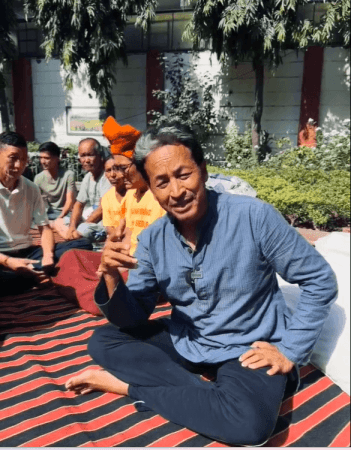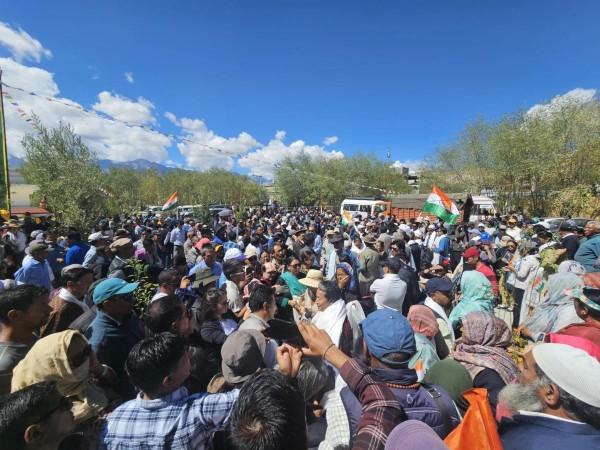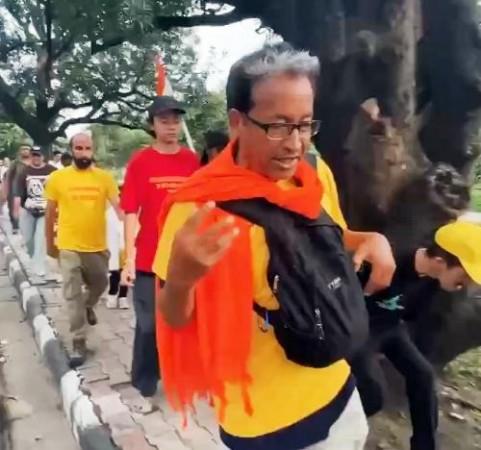
In a strong show of solidarity, the Leh Apex Body (LAB) has called on the people of Ladakh to participate in a hunger strike on October 13, in support of renowned environmentalist Sonam Wangchuk and his team.
Wangchuk, known for his pioneering work in sustainable development and climate activism, has been on an indefinite hunger strike for the past seven days at Delhi's Ladakh Bhavan.
His protest is aimed at urging the Indian government to resume talks on Ladakh's long-pending demands for greater autonomy and representation.
The hunger strike is a part of a larger movement that has been gaining momentum across the region, with the people of Ladakh rallying around a four-point agenda, which includes:
Inclusion in the Sixth Schedule of the Constitution: Ladakhis are demanding constitutional safeguards to preserve the region's unique culture, language, and identity. The Sixth Schedule, which provides special protections to tribal areas in India, is seen as critical to maintaining Ladakh's distinct character and way of life, particularly after its separation from Jammu and Kashmir in 2019.
Statehood for Ladakh: Since the abrogation of Article 370 and the bifurcation of Jammu and Kashmir in August 2019, Ladakh has been functioning as a Union Territory. Local leaders and activists have been calling for full statehood, which would grant the region its own legislature and greater control over its governance.
Establishment of a Public Service Commission (PSC): The absence of a regional PSC has left Ladakhis without an organized framework for recruitment into local government jobs. This has led to widespread discontent, with many young people feeling that they are being deprived of employment opportunities and fair representation in the workforce.
Separate Lok Sabha Seats for Leh and Kargil: Currently, the districts of Leh and Kargil share a single Lok Sabha seat, which limits political representation for both areas. Activists have been demanding separate parliamentary constituencies for the two districts to ensure that the unique needs and aspirations of each region are addressed.

Growing Concerns Over Health of Hunger Strikers
During a press conference held in Leh, Tsering Dorjey Lakruk, Chairman of the Leh Apex Body, expressed deep concern over the deteriorating health of Sonam Wangchuk and his supporters, who have been on hunger strike in Delhi for over a week. Lakruk highlighted the urgency of the situation, stating that Ladakh is going through a "challenging and difficult time," and accused the central government of turning a blind eye to the region's growing unrest.
"Ladakh's struggle is not new. For years, we have been fighting for our rights, for recognition, and for the preservation of our culture and identity. Yet, the government continues to ignore our pleas," Lakruk said, adding that the hunger strike is a peaceful yet powerful way to draw attention to Ladakh's issues.
He called on the people of Ladakh to join the hunger strike on October 13 to press the Indian government to engage in meaningful dialogue with Ladakhi leaders.
The Leh Apex Body, along with the Kargil Democratic Alliance (KDA), has been at the forefront of the movement for Ladakh's Sixth Schedule status and statehood. Both organizations have been spearheading protests, agitations, and discussions with the government for the past four years, ever since Ladakh was made a Union Territory. Despite multiple assurances from political leaders, the demands of the region remain unmet, causing frustration and discontent among the local population.

Wangchuk's hunger strike enters 7th day
Sonam Wangchuk's hunger strike has taken on symbolic importance, highlighting the long-standing grievances of Ladakhis who feel their voices are not being heard by those in power. Wangchuk, a globally recognized figure in climate activism and the driving force behind many innovative projects in Ladakh has always been a staunch advocate for environmental conservation and sustainable development in the region. His decision to launch an indefinite hunger strike is seen as a last-ditch effort to get the central government to pay attention to the issues plaguing Ladakh.
Wangchuk has repeatedly stressed that the people of Ladakh have made immense sacrifices for the security and stability of India, often without formal recognition or compensation. "We have worked for the security of this country without uniforms, without salaries," he said, pointing out that the contributions of Ladakhis to the nation's defense and unity are undeniable. He has emphasized that Ladakhis deserve to be treated with dignity and respect, and their demands should be taken seriously by the central government.
Despite the intensity of the protest, no representative from the government has approached Wangchuk or his supporters since the hunger strike began. This lack of response has further fueled frustration among Ladakhi leaders and activists, who see it as a reflection of the government's indifference toward their demands.
Movement started for demands of Ladakh
The struggle for Ladakh's inclusion in the Sixth Schedule and the demand for statehood is deeply rooted in the region's desire to preserve its unique cultural and ecological identity. Ladakh, with its predominantly tribal population, has always prided itself on its rich heritage, distinct customs, and close-knit communities. However, since being carved out as a separate Union Territory, there is growing concern that Ladakh's tribal identity could be diluted, and its fragile ecosystem may be further threatened by unchecked development.
The Sixth Schedule offers protection to tribal areas by granting them greater autonomy and ensuring that local laws are designed to protect their culture, land, and resources. Many Ladakhis believe that without these safeguards, their way of life is at risk, especially as the region continues to attract investment and development projects that could harm its delicate environment.
A call for nationwide solidarity
The Leh Apex Body's call for a hunger strike on October 13 is seen as a crucial step in escalating the movement for Ladakh's rights. By urging people from all walks of life to join the protest, the LAB hopes to create a unified front that will compel the Indian government to engage in dialogue. Lakruk, along with other leaders, believes that peaceful mass action is the only way to push the government to take notice of Ladakh's long-standing demands.
As the hunger strike continues and Ladakh's leaders remain steadfast in their pursuit of justice, the region's eyes are now on New Delhi. The question remains whether the government will respond to Ladakh's cries for recognition and autonomy or continue to remain silent. For the people of Ladakh, this movement is not just about constitutional protections or political representation; it is a fight to protect their identity, their heritage, and their future.

















